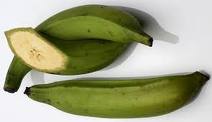Plantains are very close relations to bananas and you could be forgiven for confusing them. They grow on the same types of trees as bananas but are longer and can be used at any of their three stages of ripeness. The ones used for cooking savoury dishes are mainly the green ones (verde), then come the yellow plantain ( ponto{n}) in the mid-stage of ripeness, and these are semisweet, as the starch of the green plantain has begun to turn into sugar. Finally the black, ripe plantain (maduro) is the sweet one that can be eaten raw or used in desserts. (This should not be confused with the plant plantain, Plantago major.)
 When the plant was named by Linnaeus the Swedish botanist in the 18th century he called it and the banana genus Musa after the Arabic word for the Biblical Moses, and the plantain became paradisiaco because the Koran says that it is the tree of
When the plant was named by Linnaeus the Swedish botanist in the 18th century he called it and the banana genus Musa after the Arabic word for the Biblical Moses, and the plantain became paradisiaco because the Koran says that it is the tree of It is said that Alexander the Great encountered the plantain on his campaign in India US South East Asia and probably the Indian subcontinent.
 Green plantain taste a little like a potato but it is starchier in texture, and can be fried along with a yam or even a sweet potato. When they are green you can do the same with them as you can with a potato in terms of cooking them. They are a little difficult to peel and the easiest way of doing this is to cut two centimetres from each end and then make a cut in the peel which doesn’t quite penetrate the flesh. Slide the knife along the length of the fruit and then it is easy to peel it with your fingers, as you would a banana.
Green plantain taste a little like a potato but it is starchier in texture, and can be fried along with a yam or even a sweet potato. When they are green you can do the same with them as you can with a potato in terms of cooking them. They are a little difficult to peel and the easiest way of doing this is to cut two centimetres from each end and then make a cut in the peel which doesn’t quite penetrate the flesh. Slide the knife along the length of the fruit and then it is easy to peel it with your fingers, as you would a banana. If you buy green plantains and want them to stay that way you can put them in a pot filled with water, cover it and they will stay green for several days. On the other hand, if you buy yellow ones and want them to ripen, keep them in a paper bag for a few days.
 Plantains contain vitamins A, C, E and K as well as some B-complex vitamins and are rich in potassium. They also contain other minerals, notably calcium, iron, phosphorous, magnesium, selenium and zinc. Apart from these they also contain Omega-3 and -6 fatty acids and 18 amino acids as well as flavonoids.
Plantains contain vitamins A, C, E and K as well as some B-complex vitamins and are rich in potassium. They also contain other minerals, notably calcium, iron, phosphorous, magnesium, selenium and zinc. Apart from these they also contain Omega-3 and -6 fatty acids and 18 amino acids as well as flavonoids. It is said that plantain juice, extracted straight from the tree is an antidote to snake bites, and that the mashed pulp of the ripe ones makes a good face mask.
 In
In Plantains were introduced into the Caribbean islands by Dominican monks from the Canary Isles, and they have become an island staple eaten in dishes of rice and as side dishes which can be mixed with chicken curries. You fry the plantains and then add them to meat dishes after they have been cooked, as a plantain doesn’t take long to cook and soggy ones don’t taste right.
Try this recipe for fried plantains and then either serve as a side dish or stir into already cooked meat dishes. You can omit the chilli powder if you don’t want to have the hotness.
Ingredients
be heated to high temperatures without burning
4 or 5 green plantains cut into 5 centimetre lengthsand the thickness of French fried potatoes
chilli powder
Method
Heat the oil in a shallow frying pan and cook the plantains on both sides for 3 minutes.
Drain on absorbent paper to soak up the excess oil.
Either serve as a side dish or with rice or a meat dish, as described above.
These have Taste and are a Treat.




